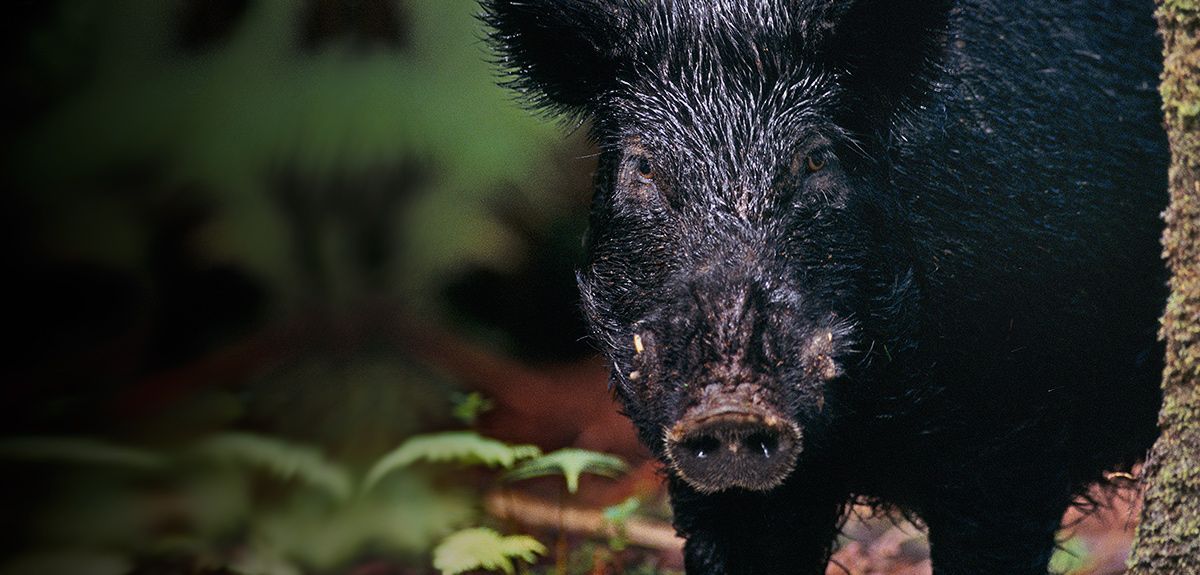
Credit: Jack Jeffrey Photography.
Throughout history, humans have preferred their pigs to be black
Scientists have identified a new genetic mutation responsible for the black colouring of the coats of pigs in Hawaii, which is different to the Asian or European mutations leading to the black colour. Their paper suggests that human societies have independently selected domesticated pigs that express the trait of black-coloured coats on at least three separate occasions because they liked the novelty colour.
Pigs have played an important cultural role in Hawaii since Polynesian explorers first introduced the domestic animals to the islands about 800 years ago. However, debate has centred on whether Hawaii’s modern feral pigs (modern populations that were once descended from domestic pigs but are now living in the wild) are from Polynesian stock or whether they descend primarily from the European domestic pigs that travelled with explorer Captain Cook who arrived in Hawaii in 1778.
New research led by the University of Oxford helps settle the debate after scientists examined the DNA sequences of modern feral Hawaiian pigs. They find that today’s feral pigs ARE mainly the descendants of the Pacific family brought by the Polynesians. In addition, the scientists identified a new genetic mutation responsible for the black colouring of their coats. This is particularly significant because the Hawaiian feral pigs were expected to have either the Asian or the European genetic mutation leading to black coats. Instead, they possess a unique new mutation which shows that no matter where in the world pigs are found, humans have a penchant for preferring black coats and select those pigs that express this trait. The findings are published in the Royal Society journal, Open Science.
An international team of researchers studied the mitochondrial DNA and MC1R gene sequences in tissue samples collected from 57 modern feral Hawaiian pigs. They found a novel mutation in all the black-coloured pigs which is different to the mutation in European and Asian domestic pigs with black coats. This finding suggests that for thousands of years, humans in different parts of the world have been independently selecting and breeding pigs for their black colour.
Humans love all kinds of coloured coats and have selected for black coats at least three times independently in domestic pigs in Europe, Asia, and the Pacific.
Senior author Professor Greger Larson, the Palaeogenomics and Bio-Archaeology Research Network
Senior author Professor Greger Larson, from the Palaeogenomics and Bio-Archaeology Research Network at the University of Oxford, said: ‘The first pigs introduced to Hawaii by the Polynesians were kept as domestic animals. No wild boar have black colours since natural selection only allows camouflaged pigs to survive long enough to reproduce. Humans, on the other hand, love all kinds of coloured coats and have selected for black coats at least three times independently in domestic pigs in Europe, Asia, and the Pacific. In the case of pigs, black has always been the new black.’
Existing academic literature describes how Polynesians were experienced sailors who spread across the Pacific region, bringing dogs, pigs, chickens and sweet potatoes in their boats. The researchers found that more than 90% of the modern Hawaiian pigs in the sample possessed genetic material consistent with a Polynesian origin. The study suggests, however, that further research is needed to pinpoint where the domestic animals were originally sourced. Some scholars have said they believe South East Asia to be their ancestral home.
The modern feral pigs in Hawaii are considered as a scourge of the islands by many. Over the last few hundred years, they have uprooted and eaten indigenous forest vegetation and preyed on the eggs of native ground-nesting birds. The discovery of their unique historical lineage may inform future debates about how to manage them in a way that is culturally sensitive but also protects native Hawaiian flora and fauna, says the paper.
The research was a collaboration between the University of Oxford; Smithsonian Conservation Biology Institute in Washington, USA; University of Hawaii; Trinity Western University, Canada; Uppsala University, Sweden; University of Liverpool, UK; Estacion Biologica de Donana, Spain; Cornell University, USA; National University of Ireland; and Texas A&M University, USA.
Research for the study was funded by the Natural Environment Research Council and the European Research Council.
The paper, A novel MC1R allele for black coat colour reveals the Polynesian ancestry and hybridization patterns of Hawaiian feral pigs, is published in Royal Society journal, Open Science
 Expert Comment: Chatbot-driven sexual abuse? The Grok case is just the tip of the iceberg
Expert Comment: Chatbot-driven sexual abuse? The Grok case is just the tip of the iceberg
 New study finds that stopping weight-loss drugs is linked to faster regain than ending diet programmes
New study finds that stopping weight-loss drugs is linked to faster regain than ending diet programmes